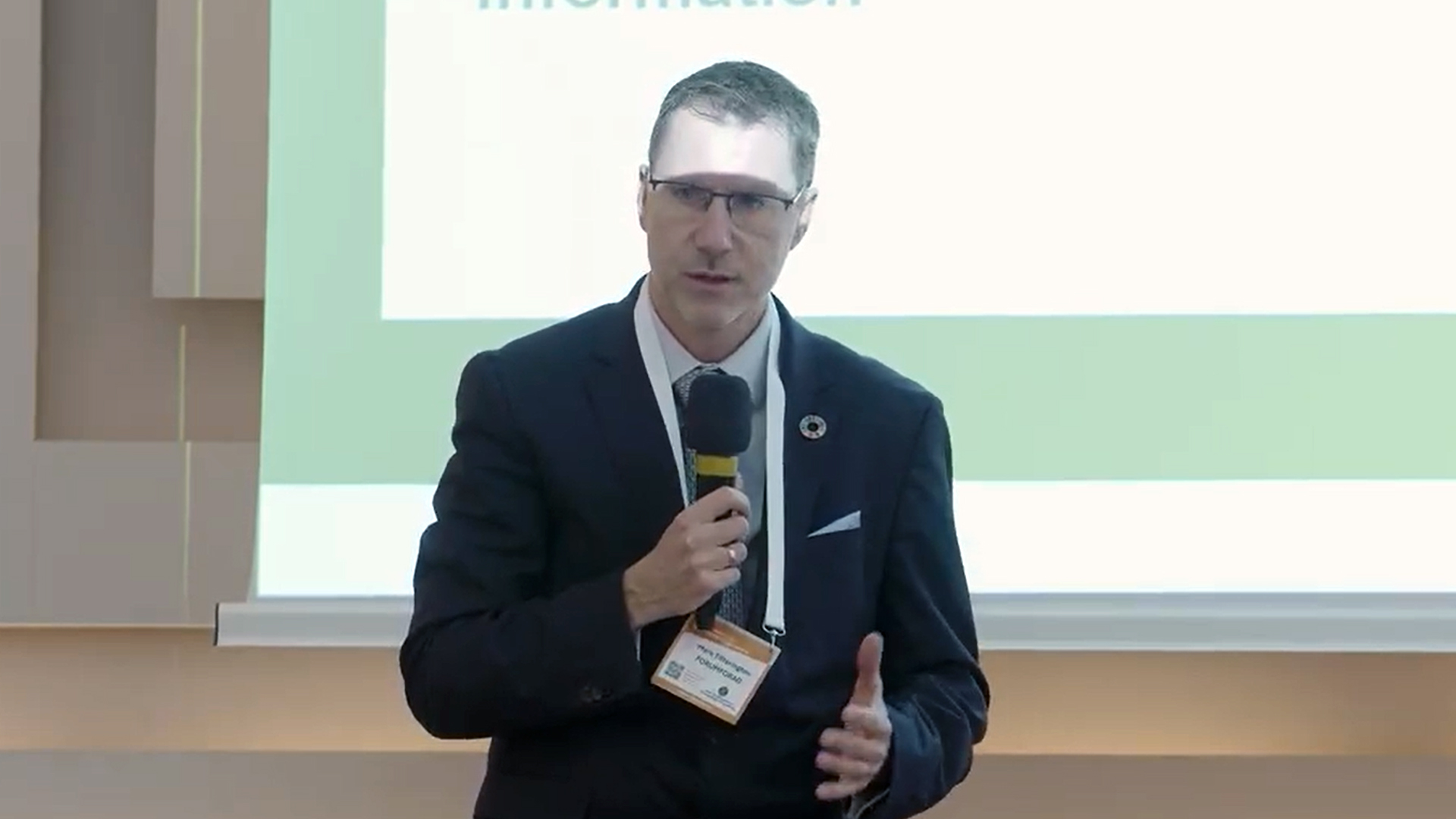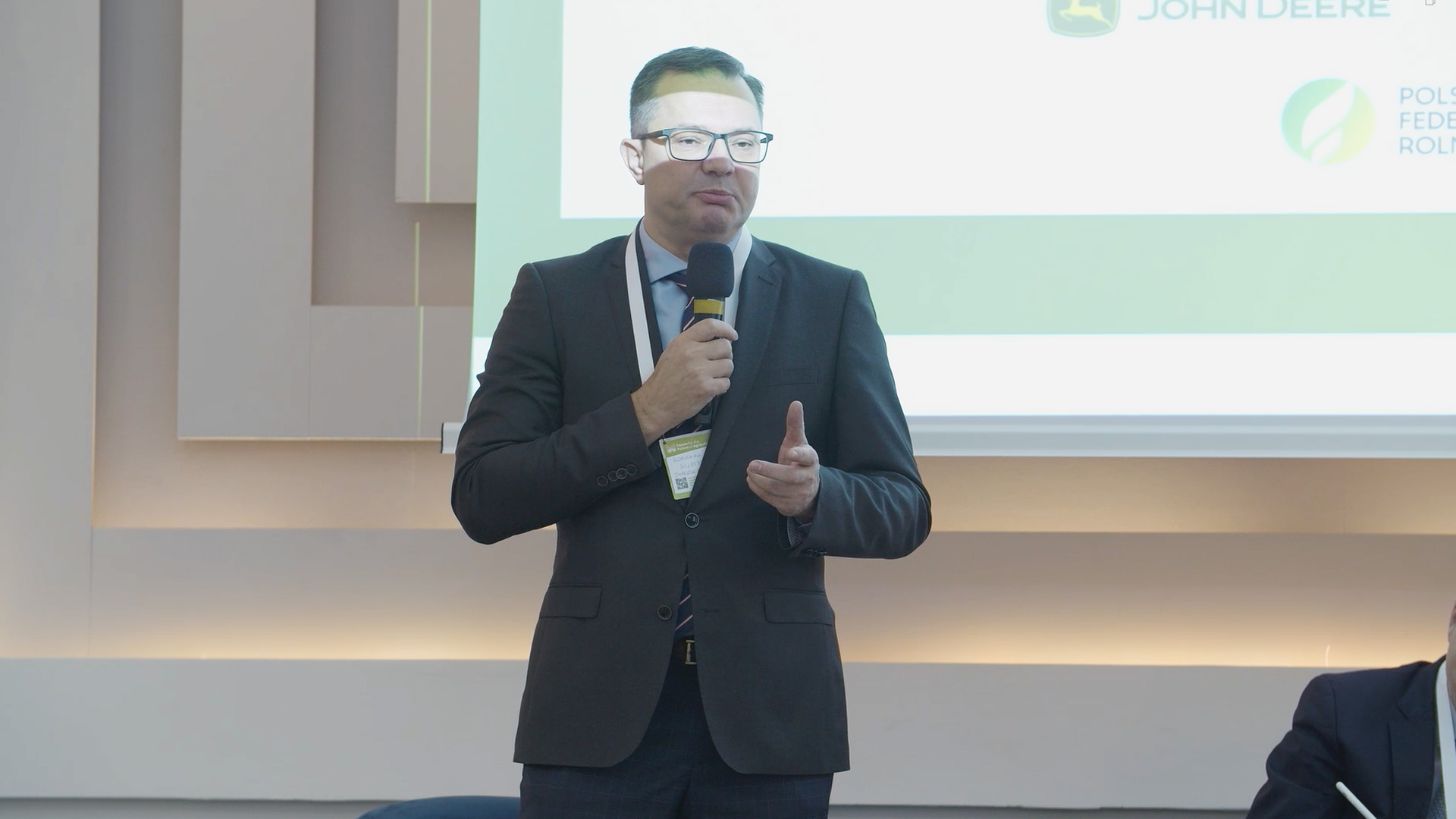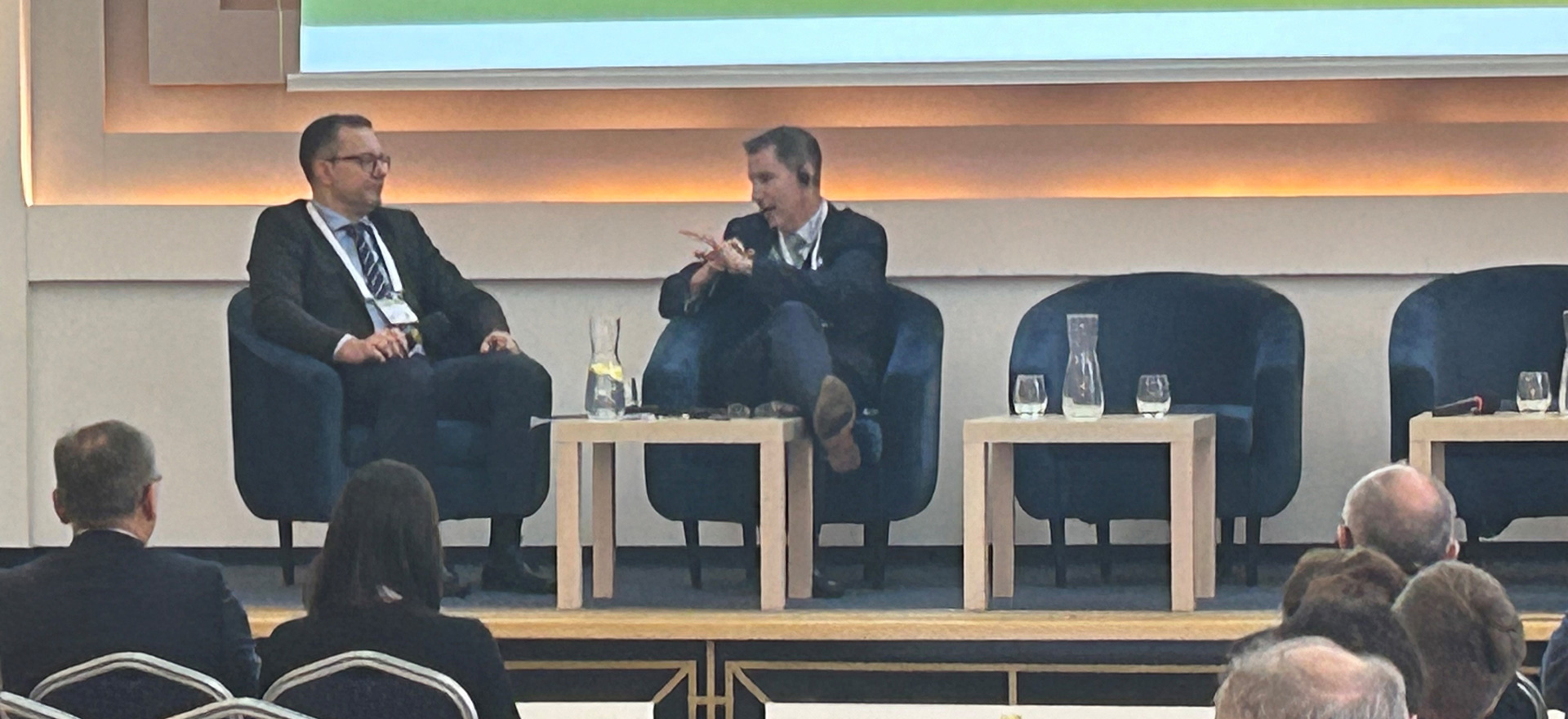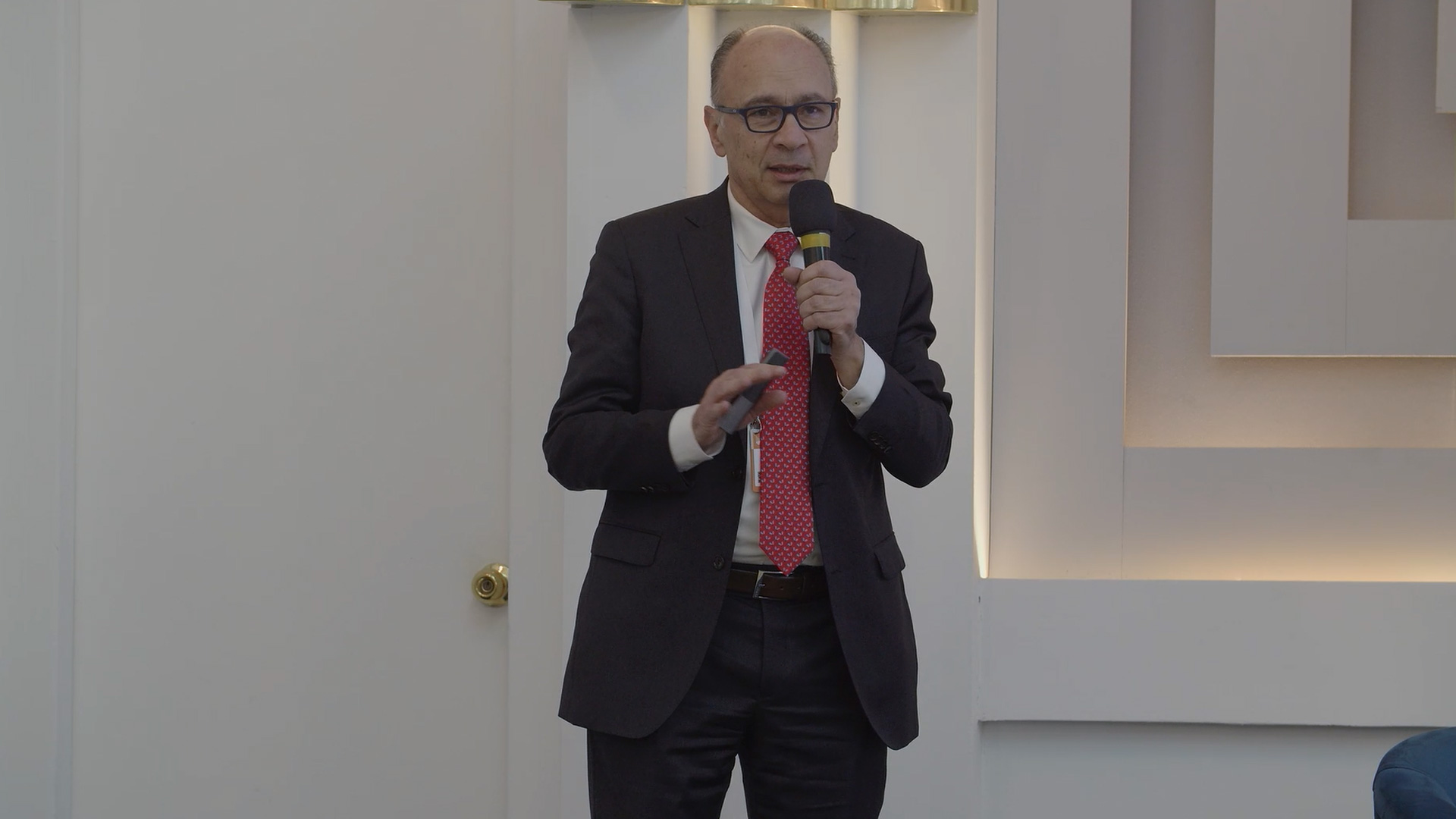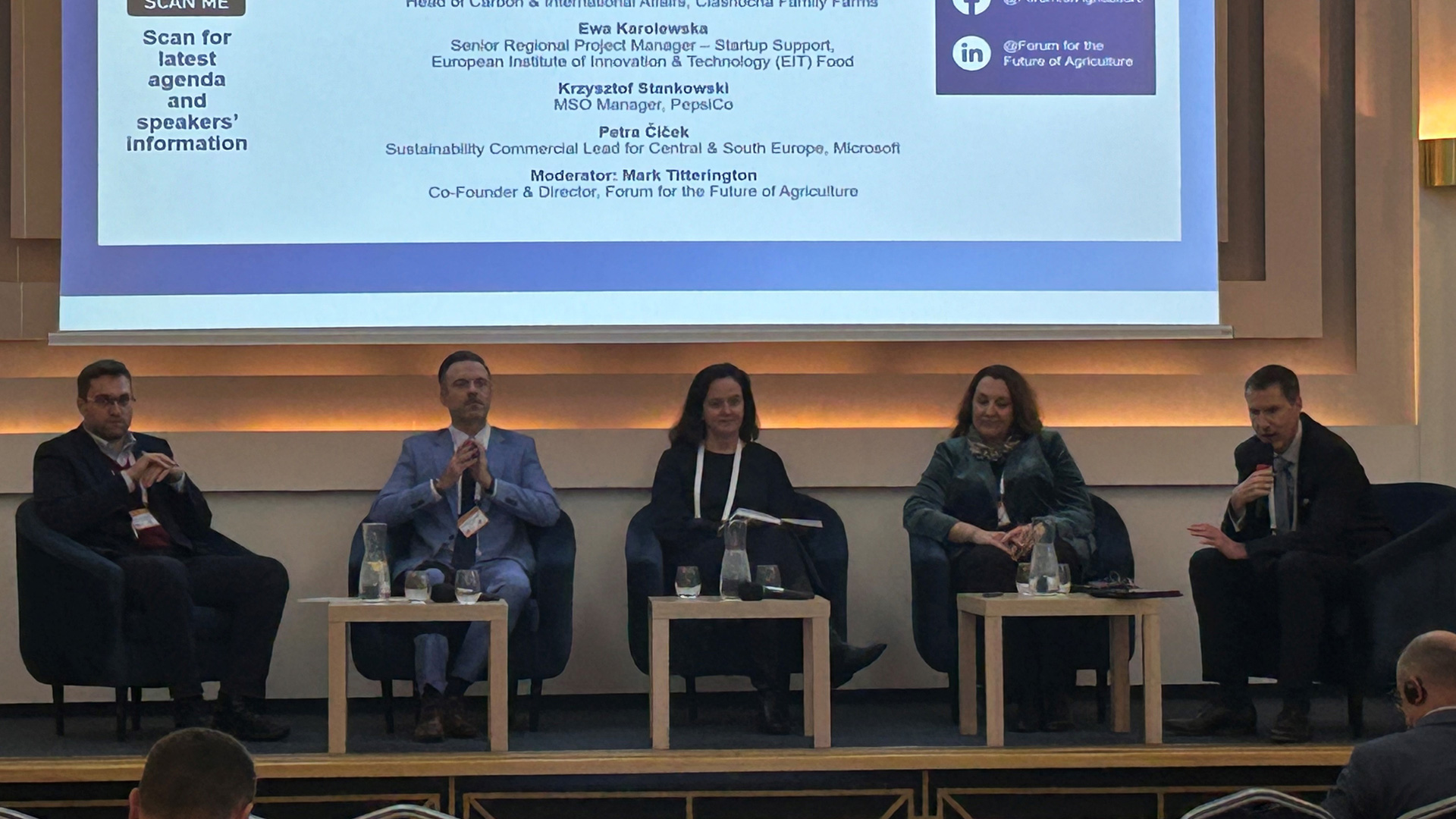2024 Regional event Poland summary
Event summary
Thursday, Dec 05, 2024
Throughout the year, the Forum for the Future of Agriculture organises regional conferences and online events to discuss agriculture and the environment at a national level across Europe. On Wednesday, November 27, 2024 the Forum co-organised a regional event with “Polska Federacja Rolna” at the Centrum Prasowe Foksal. The event focused, among others, on the reform of the CAP with the soon to be announced vision for agriculture to be presented by the new College, and of climate change and food security as one of the priorities of the forthcoming Polish presidency; as well as on importance of soil and the place of innovation to deliver these targets.
Welcome and setting the scene
“The only certainty that we have today is uncertainty, but in uncertainty we still need to find some answers and some security.” With this context Mark Titterington, Co-Founder and Director, Forum for the Future of Agriculture, welcomed the contribution of the panellists and speakers to an event focusing on current challenges, supporting the Forum’s commitment to helping to build a more resilient and sustainable global food and agriculture system.
The challenges of our time for the agricultural sector
Future agricultural policies will be decisive for the world’s food security and global security, said Bogusław Wijatyk, Director General, Ministry of Agriculture and Rural Development, Poland, picking up the theme of uncertainty. “We live at a time of extraordinary challenges,” he said. Geopolitical events could potentially jeopardize food safety and security – the Russian war in Ukraine; Ukrainian imports to Poland and subsequent disruption; the energy revolution; the need to balance environmental policies with the economic viability of farmers; the growing need for food in Africa; and the agricultural contribution of rural areas.
The priority of the Polish Presidency of the EU is to ensure food safety and security in the current challenging geopolitical context. The Presidency will foster dialogue by acting as an “honest broker”, voicing concerns of farmers and other stakeholders and building bridges to allow the EU Green Deal to be modified and become more socially acceptable.
Europe must play a part in feeding Africa, and Ukraine has to be able to contribute to the global food supply without disrupting world markets. Food security calls for maintaining the competitiveness of agriculture, ensuring guaranteed incomes for farmers and, specifically within Poland, developing rural areas.
The Polish Government will host 12 conferences dedicated to agriculture, with the most important being the one on food safety and security. “We will need to focus on food production because without food production there will be no safety in our European communities. Forgive me for being brutally honest, but the safety of our countries depends on the safety of food.”
Moving into a discussion with Mark Titterington, Mr Wijatyk addressed the question: how to bring the private and public sectors together to ensure a fair deal for farmers? Allowing EU Member States greater individual freedom on a national level could lead to a better balance between food supplies and farmers’ remuneration, he said. He expanded on the Polish Government’s work to “rural proof” the vast areas of the country that are home to many small farms to build resilience and expand the available farmland and food supply. He wanted to see farmers enabled to supply biogas plants, which would both increase energy security and farm profitability.
The Polish Government is coming at the challenges from different angles with many policies overlapping and impacting on each other. The Green Deal is fundamental, and different actors need to help increase farmers’ understanding of the content to ease tensions. “Without the Green Deal, without European policies, wellbeing cannot be guaranteed. We need to try and modify these policies, while showing solidarity, so that we can change the situation. That is why Poland tries to voice its opinion as an honest broker. We can suggest modifications for the future of agricultural policies to give us safety and security in terms of food production, to make us more resilient against any upheavals that may come, and so that the EU can stay the way it is.”
Session 1 – Special focus on Central European region: The CAP in context
Opening the session, Tassos Haniotis, Special Advisor for Sustainable Productivity, Forum for the Future of Agriculture and Senior Guest Research Scholar, IIASA, presented the global outlook for agricultural markets and the challenges facing the CAP. Drawing on the Forum’s Markets outlook workshop, Mr Haniotis highlighted key insights from the OECD-FAO market outlook on production, consumption and shifting global trade patterns.
- Global agricultural production is expected to see strong growth in feed and fuel, but lower growth in food production and stagnation in fibre.
- Consumption growth will be driven primarily by Asia and Africa, while share of consumption by OECD countries declines.
- Trade disruption and global tensions are posing significant food security risks.
- The wheat market has seen major shifts, with Russia and Ukraine becoming dominant exporters, while traditional players like the EU and U.S. have seen only slight changes in their surpluses.
- The EU stands as the only major agricultural producer that has increased production while reducing emissions.
- Food inflation has outpaced overall inflation, driven by a combination of factors including Covid-19, energy prices, and the Russian war in Ukraine.
The policy debate around the CAP has not kept pace with the dramatically changing global environment, he argued. The CAP faces major dilemmas including the role of direct payments and the pace at which they can be adjusted, as well as the balance between economic and environmental outcomes.
Panel discussion
Tassos Haniotis was joined on stage by Grzegorz Brodziak, President, Polska Federacja Rolna (Polish Agricultural Federation); Małgorzata Bojańczyk, Director, Polish Association for Sustainable Agriculture and Food (Polskie Stowarzyszenie Zrównoważonego Rolnictwa i Żywności) and Jurgen Tack, Secretary General, European Landowners’ Organization for a panel session moderated by Mark Titterington.
The panel discussed how to reconcile the objectives of the Green Deal with the competitiveness of farmers and the agricultural sector, both in Poland and in Europe? Critical areas that emerged included the need for collaboration and consolidation among Poland’s small farms; the role of private-partnership funding in supporting the transition to sustainable productivity; the challenges of over-regulation and lack of trust; and the importance of effective communication and dialogue with farmers.
Looking at Poland, Grzegorz Brodziak highlighted the structure of Polish agriculture with mostly very small farms as the main obstacle to agricultural transformation. But he saw a solution – collaboration and incentivizing farmers to operate within cooperatives or groups of producers.
On the broader European perspective, Małgorzata Bojańczyk said there was a strong need to update the CAP to allow for funding through public-private partnerships: “There has to be very tight, partnership based cooperation… there need to be specific financial incentives.”
Building on the discussion, Jurgen Tack called for strategic dialogue to be founded on facts and figures, such as the OECD-FAO data. Too often, discussions are more like ideological visions of what agriculture is and should be or should not be” and too often, decisions are made “from behind a desk without really knowing what the implication is for people in the field”. Europe regulated more for “output rather than outcome”, he said: “We have set up a system in which people are trying to get the maximum out of the system.”
As a key takeaway, the panelists took a laser focus and nominated one single thing that needs to happen in the next five years. The result: 1). Prioritise soil over other parameters. 2). Link subsidies with objectives. 3). Consider adapting policy to conditions of individual countries. 4). Take a more holistic approach to agriculture.
Session 2: The role of soil in the next CAP reform
After years of having a low profile, soil health is at the top of the policy agenda and the debate about how to deliver transformation, said Mark Titterington in setting the scene. Mark was joined by Kerstin Rosenow, Head of Unit ‘Research & Innovation’, DG AGRI, European Commission, speaking remotely from Brussels. Kerstin told the gathered audience that there is increasing recognition of soil’s importance for ecosystem services, climate change mitigation, and food production. “Soil is the very basis of everything… the basis of life of all the ecosystem services. So it’s a central element and it should be on top of the political agenda.”
Kerstin outlined the EU-level initiatives to promote soil health, including a new soil monitoring law, a billion-euro research and innovation programme, the establishment of a Soil Mission with four key pillars, and increased support for soil-related measures under the CAP. The Soil Mission’s pillars are: 1). an ambitious research and innovation programme; 2). “living labs” bringing science and innovation to the field, forest, and urban garden; 3). soil monitoring and soil indicators; and 4). action to increase soil literacy.
“For the future CAP, we want research and innovation more strongly integrated, and easier funding and upscaling for work in the field… a much more fluid system,” she stated. She was confident a balance could be found between regulatory intervention, building infrastructure to ensure knowledge transfer, and ensuring public and private incentives. After the introduction from Kerstin, the rest of the panel joined Mark on stage.
Professor. Piotr Gradziuk, Associate Professor, Institute of Rural and Agricultural Development of the Polish Academy of Sciences; Dariusz Sip, Managing Director for Poland, the Baltic States, the Czech Republic and Slovakia, Syngenta and Sebastian Balcerak, Regen Connect Program Lead, EMEA, Cargill Agricultural Supply Chains, brought their own experiences to the subject.
The discussions that followed ranged across the European Commission’s work to promote healthy soils through research, innovation, monitoring, and education, to the initiatives being undertaken by various stakeholders to incentivize and support farmers in improving soil health.
Piotr Gradziuk described how in Poland stakeholders are working to develop innovative business models, incentive schemes for farmers, and advisory services to support farmers in adopting soil-friendly practices and improving soil health. Taking the learnings from projects with sugar beet growers, Prof. Gradziuk concluded: “We need to increase the quality of soil through developing the right business models. If we create necessary economic incentives for farmers, they will embrace the solutions… farmers need to be able to make profit out of it.”
Dariusz Sip gave an overview of Syngenta’s drive to innovate in soil research and develop soil-friendly products and services. The company has a global soil health department and a healthy soil centre in Switzerland, and constantly develops leading tools for farmers such as its Interra®Scan soil diagnostics tool.
Mr Sip said the world has lost one third of productive arable land due to climate change, and the company has a global target to retrieve three million hectares of degraded land annually. “For Syngenta, it is fundamental to search for innovation in the products made available for farmers, products that are soil friendly, environmentally friendly, and that may increase productivity,” he said.
Sebastian Balcerak explained Cargill’s RegenConnect®, which is a successful private incentive scheme that aims to simplify the process for farmers to connect their environmental assets to the market and provide growers with free tools and advisory services.
There are three rules behind the success of the Cargill scheme – simplicity, flexibility, and incentives that do actually lead to measurable change. “Can the CAP get into schemes like ours?” Mr Balcerak asked. Soil is a complex area and the challenge for the future CAP is to take a similar approach to the three rules. “If you fail on the simplicity, if you fail on the flexibility, the risk of reversal goes up both on the farmers’ side and on the private sector’s side. So you need to approach it that way.”
Session 3 – Climate change and role of innovation
“There is no pathway to adapting to and mitigating climate change without innovation,” said Mark Titterington in his introduction to the concluding session. The final panel brought together experts at the cutting edge of the innovation challenge: Mateusz Ciasnocha, CEO, European Carbon Farmers; Co-Founder & Co-CEO, The Farm of Francesco; Head of Carbon & International Affairs, Ciasnocha Family Farms; Ewa Karolewska, Senior Regional Project Manager – Startup Support, European Institute of Innovation & Technology (EIT) Food; Krzysztof Stankowski, MSO Manager, PepsiCo and Petra Čiček, Sustainability Commercial Lead for Central & South Europe, Microsoft
They shared key insights including the importance of technology and data in driving sustainable agriculture, the need for collaboration across various stakeholders, and the challenges and opportunities in implementing regenerative agriculture. The panellists emphasized the importance of social innovation, trust-building, and the integration of sustainability into core business operations.
Petra Čiček of Microsoft set out the company’s mission to enable and accelerate data-driven agriculture through advanced tools like AI assistants for farmers and data integration from various sources. The main barriers to technology adoption are accessibility, ease of use, and the need for supportive policies, especially in rural areas and regions with limited internet access. “We need democratisation of access to the technology, also when we step outside of the European Union, specifically in Africa.” Technology and profitability must go hand-in-hand – “they are two sides of the same coin,” she said.
Ewa Karolewska introduced EIT Food’s activities through its regenerative innovation portfolio aimed at landscape-level change. The biggest challenge is involving financial institutions with new innovative financial mechanisms: funding is available, but it does not yet match the needs or risk is too high. EIT Food is overcoming this by facilitating a collaborative approach. There are already many small, individual regenerative agriculture projects and EIT Food invites multiple, diverse stakeholders to the table to collaborate. “We are moving from individual projects towards setting up universal standards, testing different solutions together. The biggest benefit for companies is that we are de-risking the transition by investing public funding and sharing costs.” Improved data – gathered through the likes of Microsoft’s tools – will also speed up the transition.
Krzysztof Stankowski outlined how PepsiCo works with growers – adding that 50% of the company’s business is in snacks. To demonstrate long-term commitment, he explained how PepsiCo collaborates with Yara to subsidise the cost of zero-emission fertilizers for some farmers, and will continue as long as zero-emission fertilizers are more costly than conventional. And he highlighted how open-minded growers are when they are involved in a longer-term partnership – an open attitude that leads to more innovative regenerative agriculture practices being adopted. The biggest challenge posed by climate change is time. “The climate is changing quickly, and we have to run really fast to adapt. Thankfully in our case the growers are aware of that and willing to implement practises that we propose.”
Speaking as a farmer, Mateusz Ciasnocha emphasized the importance of trust, a common language that resonates with all stakeholders, and relationships in driving the innovation that can lead to agricultural transformation. He shared the experience of engaging farmers through visits, emphasizing the need for continuous relationship-building and practical demonstrations of benefits. “Build bridges with others, not just with the like-minded, not just with the same sector. That is important… especially with those who disagree with you or have a different opinion. Continue engaging in that relationship with a ‘yes’ approach.” That is the key to enabling innovation, he concluded: “It starts with building a relationship and not aiming for something that we as farmers cannot quite comprehend, but just building a relationship and taking it from there.”
You can find out more about the speakers and watch videos of all the sessions on the event page.


